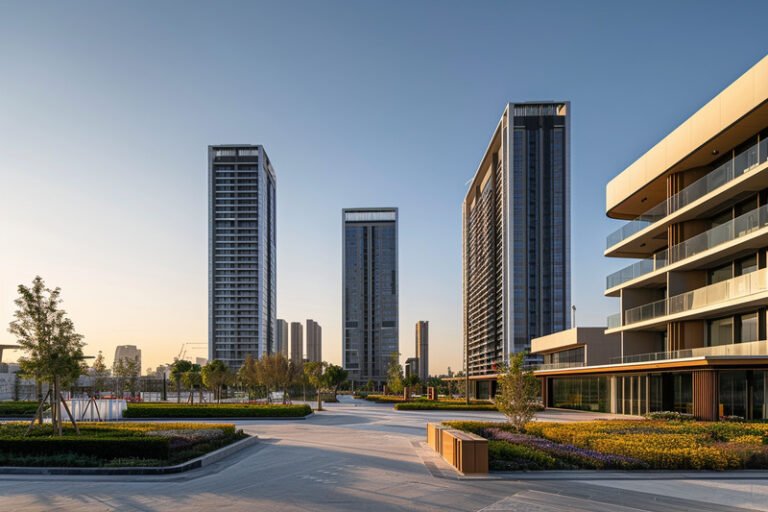Overview of Closing Costs Involved in Buying Property

When buying property in Dubai, closing costs can significantly impact your budget beyond the purchase price. These additional expenses are unique to the emirate's real estate market and can vary based on factors like property type and value.
From transfer fees and registration costs to agency commissions and mortgage charges, Dubai's closing costs require careful consideration.
Understanding these expenses is crucial for making informed decisions in Dubai's dynamic property market. Buyers should be prepared for costs such as the Dubai Land Department transfer fee, which is typically 4% of the property value, and various administrative fees.
Property registration fees, mortgage-related charges, and real estate agency commissions are also common closing costs in Dubai. Some developers may include certain fees in the property price, while others may require separate payment.
Let us help you find the perfect property. Contact us to get started.
Expatriate buyers should be aware of additional requirements, such as obtaining a No Objection Certificate (NOC) from the developer, which may incur extra costs.
Key Takeaways
When buying property in Dubai, closing costs are an essential consideration. These expenses typically range from 2% to 5% of the purchase price and are additional to the property's value. Understanding these costs is crucial for budgeting and avoiding surprises during the transaction process.
In Dubai, the most significant closing cost is the transfer fee charged by the Dubai Land Department. This fee amounts to 4% of the property's value and is usually split equally between the buyer and seller.
Real estate agency fees in Dubai generally range from 2% to 5% of the property's value. These fees are often divided between the buyer and seller, but arrangements can vary depending on the agreement.
Other closing costs may include mortgage-related expenses, property valuation fees, and administrative charges. Buyers should also factor in registration fees and potential mortgage processing costs when budgeting for their property purchase.
Common Types of Closing Costs
In Dubai's real estate market, closing costs play a crucial role in property transactions. While some costs may differ from other markets, understanding these expenses is essential for buyers and sellers alike.
Dubai's closing costs typically fall into categories such as transfer fees, registration fees, mortgage-related costs, and real estate agency fees. The Dubai Land Department (DLD) handles many of the official fees associated with property transfers. The primary fee is the transfer fee, which is generally 4% of the property's value. This fee is usually split between the buyer and seller, though arrangements can vary.
Registration fees are another significant cost, covering the official recording of the property transfer with the DLD. These fees can vary based on the property's value and type.
For buyers obtaining a mortgage, additional costs may include valuation fees, mortgage registration fees, and processing charges from the lender. These costs can vary depending on the financial institution and loan amount.
Real estate agency fees in Dubai typically range from 2% to 5% of the property value. Usually, both the buyer's and seller's agents receive a commission, often paid by the seller.
Calculating Estimated Closing Costs
Estimating closing costs for Dubai property purchases requires consideration of several key factors. Begin by calculating 2% to 5% of the purchase price as a rough estimate. Then, break down individual components to refine your budget.
The Dubai Land Department transfer fee is 4% of the property value. Include the registration fee, typically AED 4,000. For mortgages, factor in the bank's processing fee (up to 1% of the loan amount) and the mortgage registration fee (0.25% of the loan value).
Consider the real estate agent's commission, usually 2% of the sale price. Legal fees for document preparation and review should also be included. Property valuation costs range from AED 2,000 to AED 5,000.
Don't forget administrative fees charged by developers or management companies. These can vary, so check with the relevant parties for accurate figures.
Negotiating Closing Cost Responsibilities
In Dubai's real estate market, negotiating closing costs requires understanding local practices and regulations. While buyers typically bear most expenses, there's potential for negotiation, especially in a market favoring buyers. Closing costs in Dubai can include transfer fees, real estate agent commissions, mortgage fees, and property registration charges.
Identifying which costs you want the seller to cover is crucial. In Dubai, transfer fees are often a point of negotiation, with buyers sometimes requesting sellers to pay a portion or all of this fee. Other negotiable items may include maintenance fees or service charges for the property.
Work closely with your real estate agent, who can provide insights into Dubai's market trends and seller expectations. They can help you craft a compelling case based on property condition, market dynamics, or comparable recent transactions in the area.
Consider the overall deal when negotiating. In Dubai's competitive market, sellers might be more inclined to negotiate on closing costs if the offer price is attractive. Balance your requests with the property's value and current market conditions.
Strategies to Reduce Closing Costs
When buying property in Dubai, several strategies can help minimize closing costs. Shopping around for the best mortgage rates and lenders is crucial, as different institutions offer varying fees. Negotiating with your chosen lender to reduce or waive certain fees can lead to significant savings. It's also worth inquiring about potential discounts or promotions they may offer.
Carefully reviewing the closing cost estimate provided by your lender is essential. This document itemizes all fees, allowing you to identify any unnecessary or inflated charges. You can then request explanations or challenge these costs if they seem unreasonable.
Consider closing at the end of the month to reduce the amount of prepaid interest you'll need to pay at closing. In Dubai's real estate market, this can result in noticeable savings.
Explore the possibility of a 'no-closing-cost' mortgage, where the lender covers the closing costs in exchange for a slightly higher interest rate. However, be sure to calculate the long-term cost implications of this option in the context of Dubai's property market.
Some closing costs are negotiable with the seller in Dubai. You can request that they contribute towards these expenses as part of your purchase agreement, which is a common practice in the emirate's real estate transactions.
Regional Variations in Closing Costs
Dubai's real estate market has unique closing costs compared to other emirates in the UAE. When purchasing property in Dubai, buyers can expect to pay between 4% to 8% of the property's value in closing costs. These costs are generally higher than in other parts of the country.
The main components of closing costs in Dubai include transfer fees, registration fees, and agency commissions. Transfer fees, paid to the Dubai Land Department, typically amount to 4% of the property's value. Registration fees are usually around 0.25% of the purchase price.
Agency commissions in Dubai can range from 2% to 5% of the property's value, depending on the type of property and the agency's pricing structure. It's important to note that both the buyer and seller may be responsible for paying agency fees.
Additional costs may include mortgage registration fees, valuation fees, and administrative charges. These can vary based on the specific property and the financial institution involved in the transaction.
New developments in Dubai might have different fee structures compared to resale properties. It's crucial to research and budget for these costs when planning a property purchase in Dubai's dynamic real estate market.
Conclusion
When buying property in Dubai, understanding closing costs is crucial. These expenses can significantly impact your budget and vary based on the property type and location. Dubai's real estate market has unique fees and regulations that buyers must consider. Familiarizing yourself with these costs helps you prepare financially and avoid surprises during the transaction.
In Dubai, closing costs typically include transfer fees, registration fees, and agency commissions. Transfer fees are usually 4% of the property value, split equally between buyer and seller. The Dubai Land Department charges a registration fee of 0.25% of the property value.
Agency commissions in Dubai are generally 2% of the property value, paid by the buyer. However, this can be negotiable. It's important to clarify commission rates with your agent before proceeding with a purchase.
Other potential costs include mortgage registration fees, valuation fees, and property insurance. These can vary depending on your specific situation and the type of property you're purchasing.
Some developers in Dubai may offer to cover certain closing costs as part of their sales promotions. It's worth exploring these options to potentially reduce your expenses.
Let us help you find the perfect property. Contact us to get started.






